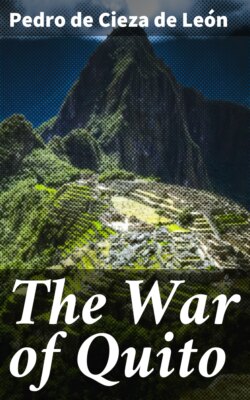Читать книгу The War of Quito - Pedro de Cieza de León - Страница 6
На сайте Литреса книга снята с продажи.
CHAPTER II
ОглавлениеTable of Contents
Of what other things happened at Panama, and what the Governor Rodrigo de Contreras and the Judges said to the Viceroy respecting the ordinances.
THERE was no less commotion in Tierra Firme than in Peru on hearing that the Viceroy intended to enforce the ordinances and to hold the kingdom under a rule of such right and justice that no one should live in licentiousness, as had hitherto been the case. Rodrigo de Contreras, who had been Governor of Nicaragua, was at that time in Panama. He saw that the Viceroy would not keep in his own bosom a single part of what he had been ordered to do: but on the contrary declared publicly, so that all might hear, affirming it with an oath, that he will not have landed at Tumbez before the Indians had been informed that they were vassals of the Emperor our Lord, and that the Encomenderos had no authority over them except for the collection of tribute which the Indians were bound to pay: also that the ordinances would be enforced as the King had ordered.
Contreras went to the Viceroy’s lodging, and said: “I cannot believe that your Lordship is ignorant of the alarm caused by your arrival with these new laws, among the Spaniards in this empire of the Indies, from the islands to this part. Even if your ears are deaf to this, as the tumult has not yet ended, you must have heard the clamour that is made over it. Neither I nor those here complain that his Majesty has sent the new laws for, like so very Christian a prince, he desires that affairs here should be ordered with rectitude and moderation. For we hold for certain that his ministers who come to execute laws, zealous for his service, will see that the state of affairs renders it advisable not to enforce them. I regret, therefore, that your Lordship has publicly declared that you will not have landed in New Castille before the new laws are published and enforced. The ordinances which I brought out, not only did I not publish, but I was in the province a year and more and had not promulgated them. Later, when it is clear that the provinces are quieted and that there is no trouble, I shall decide what should be done. For if the ordinances were hastily enforced it might cause great evils. In this country the Spaniards are not of low degree, but all consider themselves great lords of noble parentage, and would be ready to die rather than submit to the new laws, nor would dissensions and wars be wanting, the discontent being so great.”
When Contreras said this, the Viceroy replied: “If on all sides the evil is preferred to the good, and tyranny comes before loyalty, and if the King has no more part in these realms than those who are here like to give him, I can believe that what you say is correct. But if you say that his Majesty’s intention is not altered, how is it that they do not wish to comply with the royal order? You know very well the poverty under which our fathers came to discover this empire. It is not so many years since Columbus sailed from Spain, and avarice has grown rapidly among those who have settled here. To gain riches they have done many evil things, almost totally ruining the provinces. If these laws had not been enacted, in ten years there would be nothing left but ruins, and the rivers and mountains. Let no one think that ministers of the King will be guided by the appetites of those here, nor be surprised if I behead them as traitors.” Saying this the Viceroy retired into his chamber: and the Governor Rodrigo de Contreras departed.
Soon afterwards the Licentiate Zarate, regretting that the Viceroy should have said that he would soon enforce the new laws, and not wishing to speak of a thing which was so hateful to all, entered where the Viceroy was. He then said that, hearing what was talked about concerning the new laws, and understanding that they were to be enforced, he thought it would be proper not to allude to the subject; rather keep it at the bottom of a box until the land of Peru was reached, and it was ascertained whether the laws could be conveniently promulgated. To this, and to what the Judges Cepeda, Alvarez and Tejada said, the Viceroy replied that he would do what he thought proper. As to what the accountant Juan de Caceres affirmed, that, from the news he had received from people in Peru, he gathered that if the ordinances were at once enforced, the people would take up arms rather than obey, the Viceroy told him harshly that if he was not a servant of the King he would order him to be hanged.
These and some other things having happened, the Viceroy hurried his preparations to go on to Peru, while the Judges continued to talk about the ordinances, advising that before they were promulgated, time should be given for the court of justice to be formed, so that then the orders of his Majesty might be carried out, after mature deliberation. But the Viceroy thought little of their advice; replying that his duty was to obey his orders, and for doing so he alone sufficed. So the want of confidence between him and the Judges was increased.
